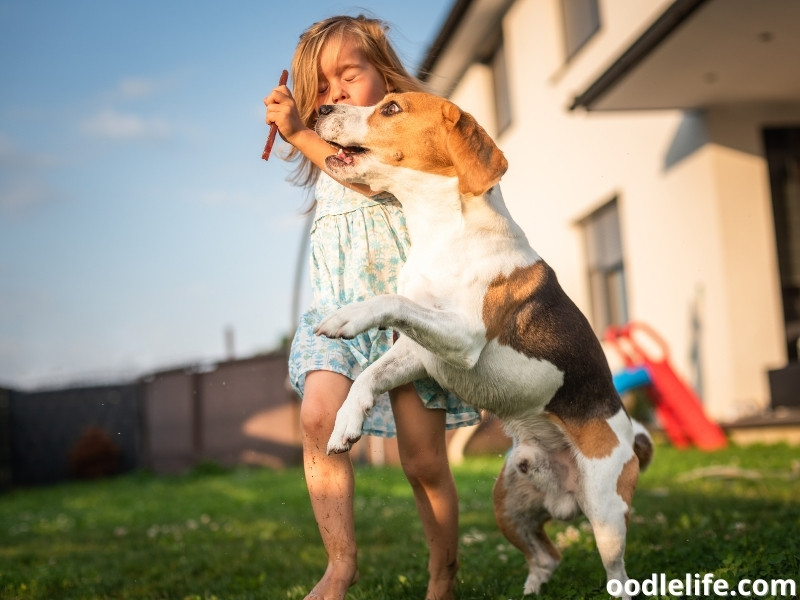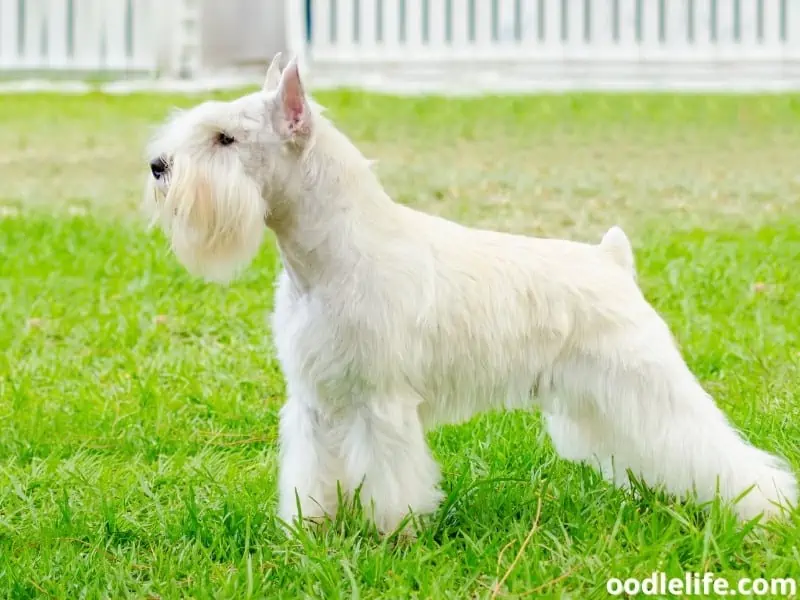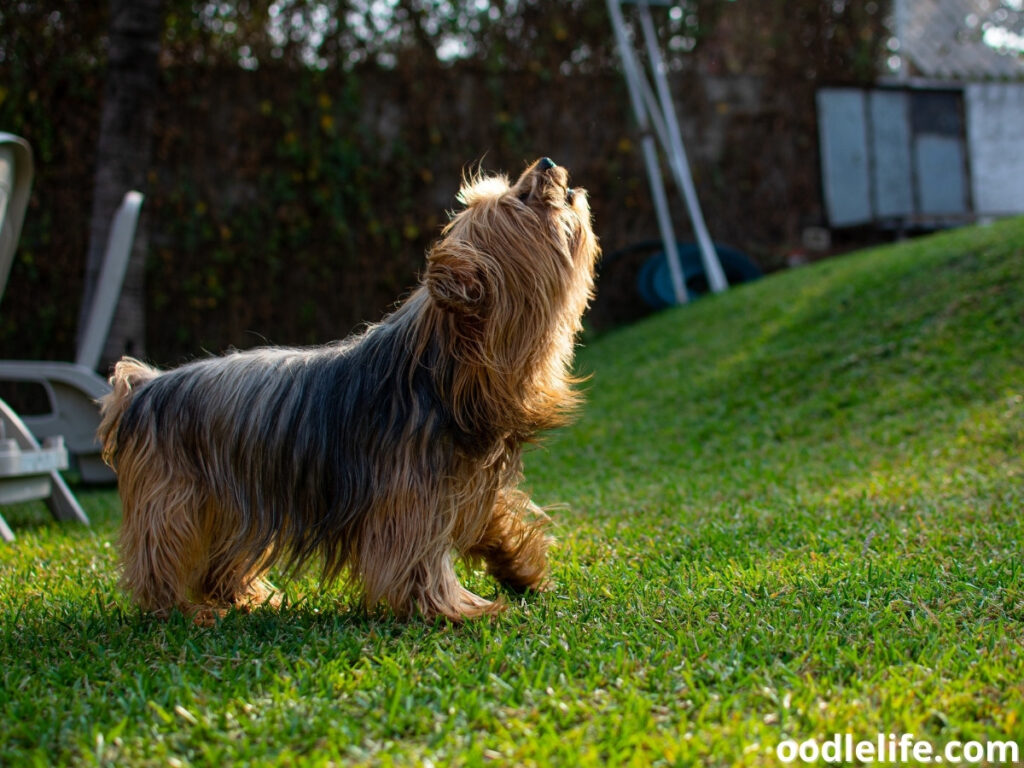Which Dog Barks the Most? (7 Barkiest Breeds with photos)
Dogs are known for their unique personalities, and one of the most noticeable traits they can have is barking. Different breeds bark more than others, and some are notoriously loud.
Knowing which dog barks the most can help decide which breed best suits your home or lifestyle.

This article will explore seven dog breeds that tend to bark the most, as well as suggestions for reducing excessive barking. These are not in any particular order.
1) Beagle
The Beagle is one of the most popular dog breeds in the world and is also known for being one of the barkiest. Beagles have a loud, ringing bark that can be heard from miles away, which is handy if you’re looking for them around your house.

They are often used as hunting dogs as their sense of smell is incredibly acute, and their barking can help flush out their prey.
Beagles are friendly, intelligent, and loyal companions who will fill your home with lots of love and laughter. But they do come with an added bonus – they bark a lot! While it may be delightful to some people, excessive barking can become annoying to others.
Thankfully there are ways to reduce or completely eliminate this behavior in Beagles so that everyone can enjoy their company without the barking becoming too much.
- First, make sure you take your pup outside regularly to exercise, as this helps them expend excess energy, which could contribute to barking.
- Second, train your pup early on to only bark when necessary by providing positive reinforcement when you want them to stop barking. This will help teach your dog that there is a time and place for everything, including barking.
- Lastly, create an environment where boredom isn’t an issue; provide plenty of toys and activities that keep them engaged and entertained throughout the day, so they don’t feel like they have nothing better to do than bark all day long.
Following these steps will ensure that your beloved Beagle won’t drive you crazy with incessant barking. You’ll still get all the love and loyalty of owning a Beagle while having a peaceful household at the same time!
2) Miniature Schnauzer
The Miniature Schnauzer is a small but mighty breed and is also known for being quite vocal. While the breed is relatively easy to train and generally does not bark excessively, there can be times when all their pent-up energy comes out in the form of barking. This breed loves to yap, which can make them both adorable and annoying at the same time!

Miniature Schnauzers are incredibly loyal and loving dogs who make wonderful companions. They love being around their people, so they will follow you around the house and look for ways to keep themselves entertained – including barking.
Owners should take note that while this barking may be cute sometimes, it can quickly become excessive if not dealt with properly.
- The key to reducing your pup’s excessive barking is to provide plenty of mental stimulation during their waking hours. In addition, make sure you give them lots of opportunities to exercise both mentally and physically throughout the day; this will help them expend extra energy that could fuel their barking habit.
- Additionally, positive reinforcement training is another excellent tool for teaching your pup when it’s appropriate to bark (for example, if someone is ringing your doorbell) and when it’s inappropriate (like driving you crazy in the middle of the night).
Overall, having a Miniature Schnauzer in your life can bring lots of joy – just remember that whenever they start getting too loud with their vocal tendencies, a little patience goes a long way!
3) Chihuahua
The Chihuahua is one of the most beloved toy breeds in the world and has gained a reputation for being one of the barkiest of all. Chihuahuas are energetic, loving, and loyal companions who look to their owners for protection.

This breed is known to be quite vocal and can reach high volumes with their barks, making them endearing and annoying, depending on how much barking they do!
Just like any other breed, excessive barking should be discouraged as it can become disruptive inside and outside your home.
Thankfully, there are ways to reduce your pup’s barking while still allowing them to express themselves when necessary.
- First off, exercise is an important part of controlling your pup’s energy level; providing plenty of running time every day will help them expend excess energy that could fuel non-stop barking.
- Another good idea is to invest in some positive reinforcement training methods so that you can teach your pup when it’s appropriate to bark (for example, if someone is ringing your doorbell or knocking at your door) and when it’s inappropriate (if they start yapping in the middle of the night).
- Last but not least, create an environment where boredom isn’t an issue; providing stimulating toys and activities will help keep them occupied throughout the day so they won’t feel like they have nothing better to do than bark all day long.
4) German Shepherd
The German Shepherd is one of the most popular breeds in the world and is often touted for its loyalty, intelligence, and strength. However, they are also known to be quite vocal with their barking. As a result, some owners may find it challenging to manage when they feel extra energetic and noisy!

While the German Shepherd is an amazing breed to have as a pet, excessive barking can become a problem if left unchecked.
Thankfully, there are several things you can do to help reduce your pup’s barking without taking away all of their opportunities for expressing themselves.
- The first step is to provide plenty of exercise every day. For example, make sure your pup gets a good run or long walk every day so that they have an outlet for extra energy that could fuel their barking habit.
- Another way to reduce barking is positive reinforcement training; this will teach your pup when it’s appropriate to bark (if someone reaches for the doorbell) and when it’s inappropriate (if they bark incessantly throughout the night).
- Additionally, ensure you keep them entertained during their waking hours with stimulating activities like puzzles or toys; this will help keep them occupied so they don’t get bored and start looking elsewhere for entertainment – such as barking!
5) Yorkshire Terriers
The Yorkshire Terrier is a beloved companion breed for many households and has made its mark on pop culture. Unfortunately, this breed is known to also be quite vocal with their barking – meaning owners must take measures to ensure the pup’s barking doesn’t reach excessive levels.

In addition to being naturally alert and protective, Yorkies can also be quite territorial regarding their home environment—which means they may not take kindly to strangers or other animals entering what they see as “their space.” This can lead to excessive barking if not managed properly.
Fortunately, there are a few ways you can help manage your pup’s barking habits and ensure that it doesn’t become too much of an issue for you or your neighbors.
- First of all, make sure your pup is getting plenty of exercise each day—this will help tire them out mentally and physically so they won’t be so quick to bark at every passing person or animal.
- Also, ensure your pup gets enough positive reinforcement during training sessions; reward-based training is much more effective than harsh punishments like scolding or yelling at them when they start barking excessively.
- Finally, consider investing in an anti-bark collar if the problem persists; these collars emit a gentle spray or vibration each time your pup starts barking unnecessarily, which serves as a reminder not to do it again (just make sure you follow the instructions carefully).
6) Siberian Husky
The Siberian Husky is an alluring breed that has been gaining popularity in recent years – but with its booming fame, there comes a drawback; these pups can be pretty vocal when it comes to barking.

Excessive barking can prove to be a nuisance for owners, so taking steps to help reduce the number of episodes your pup puts out is prudent.
- One way to do so is by making sure they get plenty of exercise every day; long runs or walks will help them expend energy that could otherwise fuel their barking habit.
- You can also use positive reinforcement training to teach your pup when it’s okay to bark (for example, if someone unwelcome appears near your door) and when it’s inappropriate (if they bark excessively during the night).
- Providing stimulating toys and activities throughout the day will also help keep them occupied, reducing the likelihood of boredom-fueled yapping.
An obedient and well-trained Husky can still be quite vocal – just not as much as one uncontrolled! With a bit of effort and patience, you’ll find these beautiful dogs become an ideal companion for your home without being too loud.
7) Basset Hound
It’s no secret that the Basset Hound is one of the barkiest breeds out there. This breed certainly has its charms – they’re adorable, loyal, and loving companions – but their tendency to bark can be a nuisance for owners who don’t know how to control it.

Thankfully, there are several things you can do to help reduce the amount your pup barks.
- Boredom can often lead to excessive barking in dogs, especially those with high energy levels, like Basset Hounds. To prevent this from happening, try providing your pup with plenty of stimulation throughout the day – whether it’s through interactive toys like treat puzzles or simply playing games together, such as hide-and-seek with their favorite chew toy!
- Exercise is one of the best ways to tire out your pup and reduce excessive barking. A tired dog is much less likely to bark incessantly than an energetic one – so make sure you’re taking them out for regular walks or runs. It’s also essential that you give them adequate time and space in which they can play and explore on their own terms.
- It may seem counterintuitive initially, but spending quality time with your pup can help reduce their barking levels over time! A lot of times when dogs are barking excessively, it’s because they’re feeling neglected or lonely – so make sure that you spend enough time each day giving them plenty of love and attention.
By following these steps, you can help ensure that your Basset Hound becomes a well-behaved companion that doesn’t excessively bark!
Conclusion
When it comes to barking breeds, these seven certainly have a strong claim for being some of the loudest and most persistent. However, with a little bit of patience and consistency in training, you can have a pup that is manageable and obedient.
Ultimately though, all dogs have the potential to bark and make noise when excited or startled – it’s just a matter of how loud they can be! However, with both positive reinforcement and plenty of exercise, any breed – from Basset Hounds to Siberian Huskies – can be kept relatively quiet when necessary.